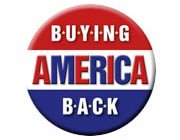A Mission to Self-Destruct: America's Culture of Imports
07/27/2012
How did we create this culture of imports? After World War II, America was the lone superpower remaining. The Marshall Plan was ushered in to help devastated European countries get back on their feet. It was a rousing success. American products were the best in the world and it was important that other countries had enough money to purchase them in order to keep our industries growing.
Later, America made concerted efforts to continue knocking down trade barriers and to buy foreign goods. It helped other countries greatly, but by the 1990s, it was apparent that the money was not coming back in equal measure, eventually forming large deficits in trade. Japan became an industrial powerhouse after the war — mostly thanks to American efforts to help them rebuild their country. We assisted in the drafting of a constitution that placed a newly developed focus on industry. Soon, Japan became an industrial leader in a number of fields, to the point where six of the top 10 best-selling cars in America today are Japanese. America helped many countries back on their feet, and our consumers delighted in the lower prices their imported goods could offer.
At the same time, other countries made purchasing their own domestically manufactured products a national priority over the following half century. As an example country, South Korea created a national manufacturing policy that today has them at the top of the world in manufacturing and industry. Until recently, it was strictly taboo for South Koreans to be caught handling or buying foreign-made goods. South Korea’s sense of consumer nationalism has survived to this day, long after a time when it was “necessary” for them to uphold it. This kind of “us-first” thinking lifted these countries and their largest corporations to a stature previously unfathomable. It is easy to see why companies like Hyundai have reached international success when you consider that 99% of the cars on the roads of Korea are Korean-made. This is true for Japan and many other countries, too. Their consumers’s domestic buying preferences are a crucial benefit for their private manufacturers. Similar preferences and cultural attitudes have prevailed in Germany, now economically the strongest country in Europe.
In America, younger generations have been brought up in a culture of “free trade,” where the pervasive attitude is that “industry doesn’t matter.” A culture of imports dominates. Manufacturing as a share of total employment has fallen from 30% in 1970 to only 10% in 2011. Other countries have suffered losses in the manufacturing employment sector as well, as a natural response to increased productivity and mechanization. Even with this, the industrial employment of Germany is still 20%, Japan is 17% and France manages to have 13%. Come on, America. Let’s use our combined efforts to at least match the manufacturing employment rate of France. It would bring our unemployment rate of 8% back down to the traditional 5%.
In this new race to the bottom, we are trading satisfying, higher-paying, higher-skilled jobs in manufacturing and industry for low paying, low-impact jobs stacking shelves at endless superstores packed with low-grade imports from other countries. Salaries get depressed, unemployment rises, and people can soon afford only the cheapest, usually imported, goods, accelerating the cycle and digging a deeper hole for all of us. Those cheap imports aren’t so cheap any more. The exchange became: good jobs sent abroad for which we received low-quality items and low paying jobs.
Those Olympic uniforms are a symbol of our current, culturally caused unemployment problem. We felt comfortable outsourcing the production of everything we used to make, from American flags to the trinkets at the Smithsonian gift shop. As we did with pollution, smoking, and car safety, we need to wake up, recognize we have an import addiction problem, and start making the individual and governmental changes to pull ourselves out of this mess.
About Alan Uke:
Alan Uke is a San Diego entrepreneur, community leader, and founder of Underwater Kinetics, which he started 41 years ago as a sophomore at the University of California San Diego. He holds more than 50 patents, and the majority of his SCUBA diving and his industrial lighting products are exported to more than 60 countries. He has won the Entrepreneur of the Year Award for Consumer Products from the Entrepreneur of the Year Institute, is a member of the World Presidents Organization, and conceived of and founded the San Diego Aircraft Carrier Museum. He is the author of Buying America Back: A Real-Deal Blueprint for Restoring American Prosperity.




Leave a Reply
Want to join the discussion?Feel free to contribute!